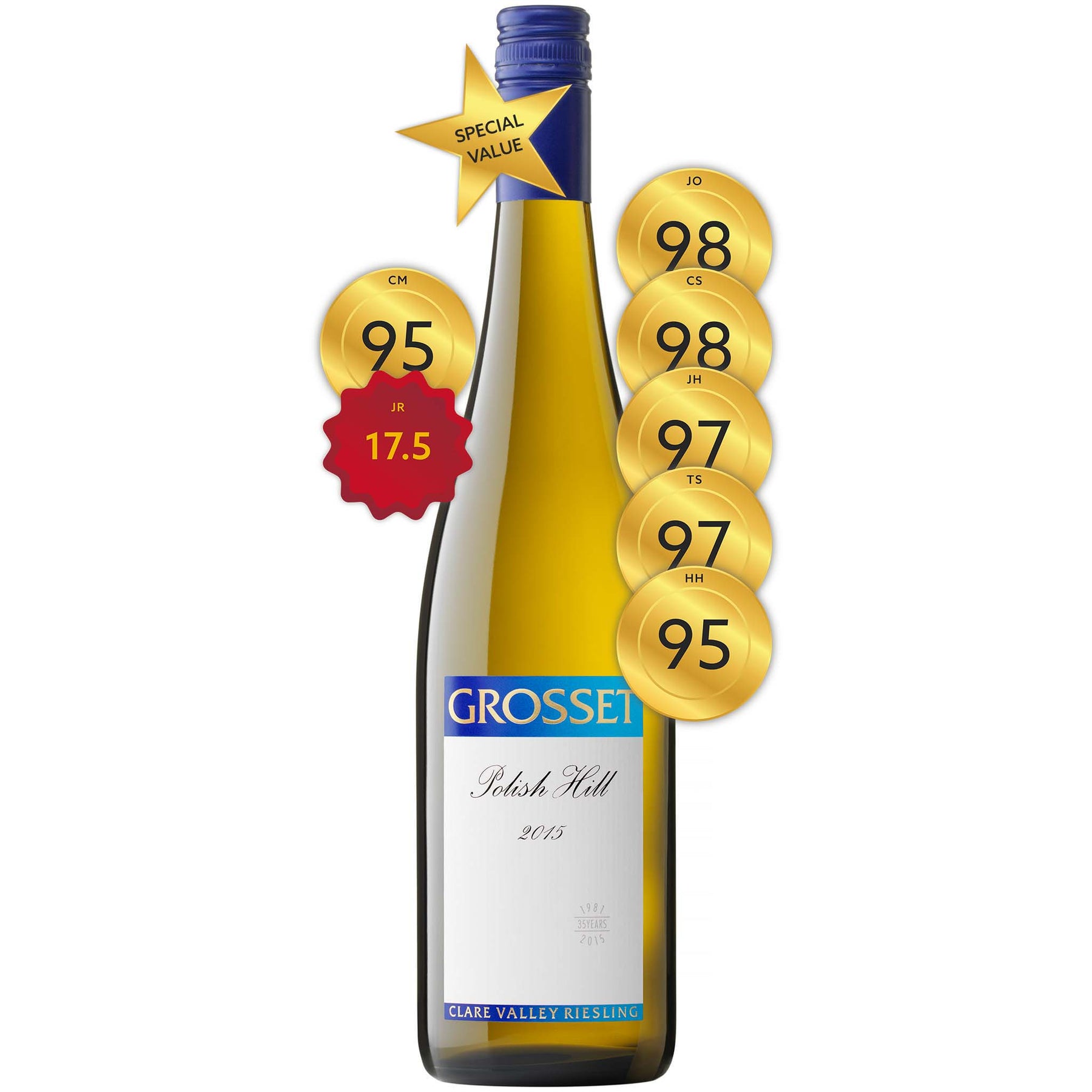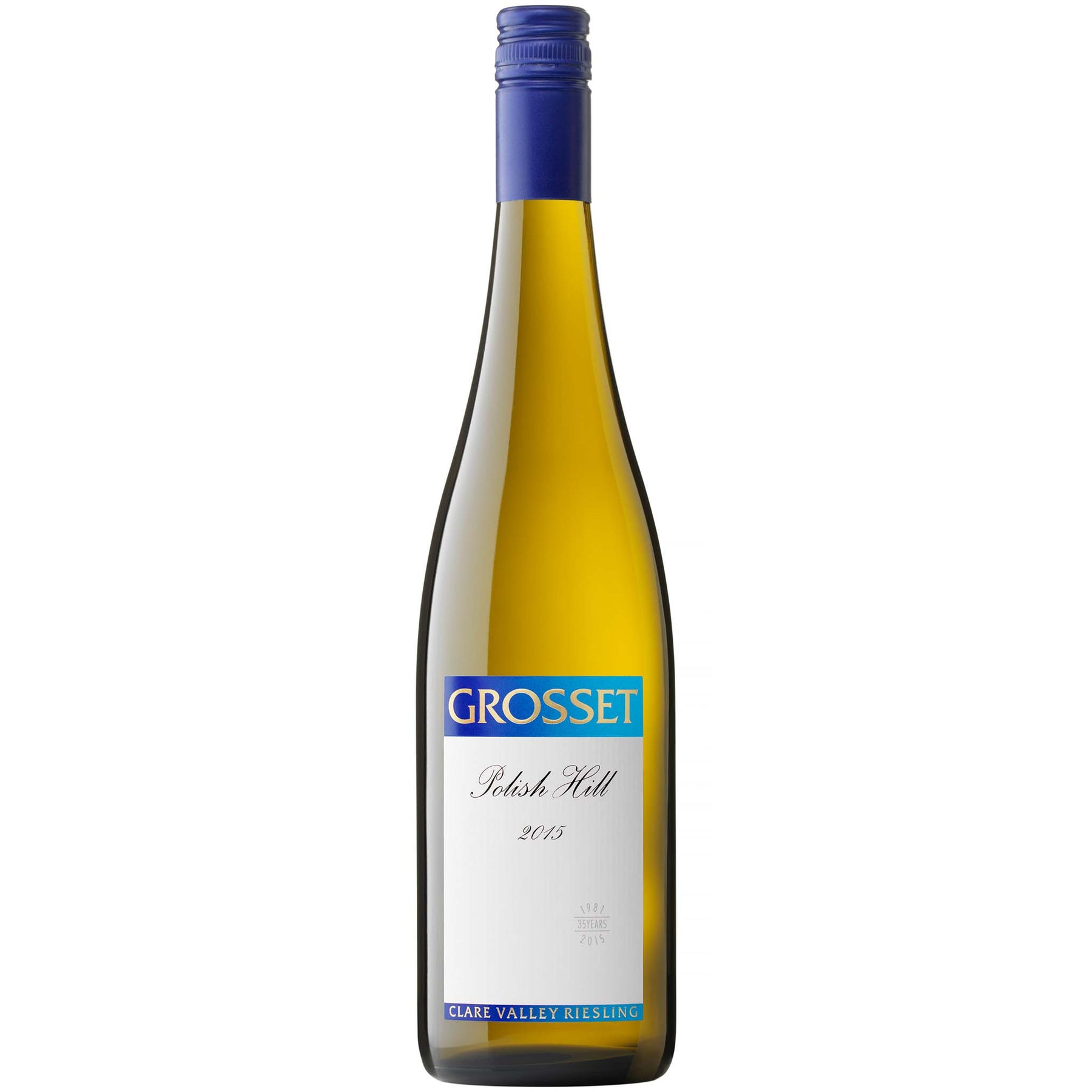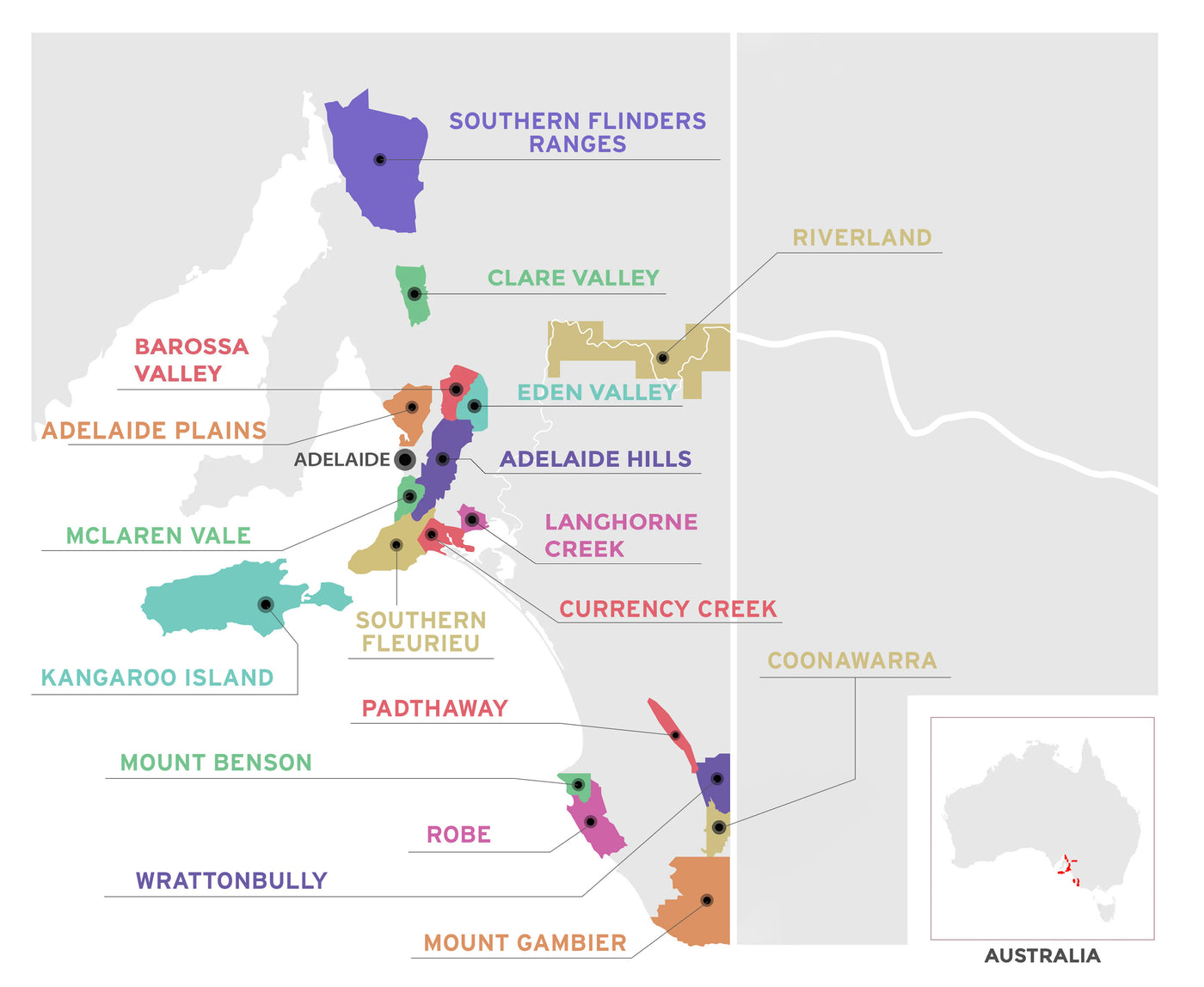

Grosset Polish Hill Riesling 2015
Style: White Wine
Variety: Riesling
Closure: Screwcap
Grosset Polish Hill Riesling 2015
Warehouse
34 Redland Drive
Vermont VIC 3133
Australia
Critic Score: 98
Alcohol: 12.7%
Size: 750 ml
Drink by: 2030
"This long-lived beautifully aromatic and concentrated wine does much to define great Clare Valley Riesling." Andrew Caillard MW
The Grosset Polish Hill Riesling is arguably Australia's best Riesling and one of the New World's greatest Rieslings. For many years it has been a benchmark wine for the Clare Valley. The wine possesses wonderful perfume, incredible fruit purity and intensity of flavour, has great finesse and ages spectacularly. The first vintage of the Grosset Polish Hill Riesling was produced in 1981. Langton's classifies Grosset Polish Hill Riesling as 'Exceptional'. Only 17 wines in total make this grade, of which only 3 are white wines.
"A riesling of extraordinary concentration, but in the most delicate, refined way imaginable – characteristics suggested by the lovely aroma and confirmed by the powerful, fine, luscious, absolutely bone-dry palate. This is as good as Australian riesling gets at present." Chris Shanahan
"A meticulously hand-tended vineyard matched by the same attention to detail in the winery, combined with an unusually cool, mild summer which heralded the earliest picking date in 35 years has resulted in a remarkable Grosset Polish Hill Riesling for Grosset. As you'd expect from this wine, it's quite shy in its infancy, though still with distinct chalky, minerally aromatics. It is amazingly intense showing shaley minerally flavours with a hint of lime juice, tightly coiled around a steely backbone, persistent, deep, and long. The finish is linear, crisp and ultra dry yet with impeccable balance. While it will improve immeasurably with time in the bottle that balance gives it an approachability especially when consumed with a platter of natural oysters or a dish of poached whiting fillets with a squeeze of lime." Grosset
Expert reviews
"An exemplary wine, perhaps with more character and individuality at this age than most Polish Hills. Its piercing and faintly spicy bouquet of lime, lemon and sweet floral notes reveals notes of citrus rind, gunflint and minerals. It's long and very dry, with a powerful, explosively concentrated presence of fruit that delivers an almost chardonnay-like fatness before culminating in an austere, smoky finish of exceptional length, savoury quality and focus. Perhaps the finest wine under this label?” Jeremy Oliver - 98 points
"A riesling of extraordinary concentration, but in the most delicate, refined way imaginable – characteristics suggested by the lovely aroma and confirmed by the powerful, fine, luscious, absolutely bone-dry palate. This is as good as Australian riesling gets at present." Chris Shanahan, 'Good food' The Canberra Times– 98 points
"The floral bouquet is still to fully open its wings and fly, but the palate makes you spring to attention, its natural acid structure providing a superb framework for the fruit to clamber all over. As you come back again and again, the purity and balance of the flavours shine even more brightly, the length and balance immaculate, lime, lemon and a hint of apple exactly pitched. It is a finer wine than the joyous Springvale. 12.7% alc. Drink by 2030." James Halliday, Halliday Wine Companion - 97 points and Special Value Wine ★
"Delicacy, grace and understated character define an exceptionally pure and pristine Polish Hill whose greatness is declared as much by what it is not as what it is. Mouth-enveloping texture declares the ancient soils of Polish Hill. Length is undeterred, line undeviating and sheer stamina and poise, breathtaking." Tyson Stelzer, Wine Business Monthly (WBM) - 97 points
"Bright, pale yellow hue; the aroma is brilliantly fresh and pristinely clean, with citrus and blossom-like fruit precisely framed. The palate is very fine and delicate, yet intense and long. It's tightly focused and undeveloped. A wine of great delicacy, which looks to have a very bright future. Drink: 2015 – 2027." Huon Hooke, The Real Review - 95 points
"It's purity personified. This of course is what you would expect of a Grosset Polish Hill riesling, but this release presents a particularly intense portrayal of lemon and lime flavours, its slatey, spicy, zesty inflections crushed down and compounded into a chalk-like finish. It has power, it has length, and it is pristine. Drink: 2015 – 2025+." Campbell Mattinson, The Wine Front – 95 points
"Intense nose. More obvious 'minerality' than the Springvale 2015. Crystalline with a great spread of refined fruit. Not a hint of sweetness. Much more reserved and a little more austere than the Springvale but admirably persistent. 12.7% Drink 2017-2027." Jancis Robinson MW – 17.5/20 points
Awards
Special Value Wine – Halliday Wine Companion ★
Polish hill vineyard
The Grosset Polish Hill Vineyard is an eight‑hectare, organically certified vineyard in the Clare Valley. The vineyard is named after the nearby Hill River Settlement established by Polish immigrants in the 1840s. The vineyard is relatively close-planted and comprises three clones of Riesling, two German and one rare local clone, and produces an average of just two bottles of wine per vine.
Located on a hard rock site at an elevation of 460-480 metres, the gently sloping vineyard sits on silt and shallow shales over a thin crust of clay and gravel, on top of a bed of blue slate estimated to be 500 million years old. The vines struggle to draw nutrients from the soil, so the bunches and berries are small and thick skinned. This vineyard exemplifies how old-rock profiles can contribute to a wine's character.
The vines are dry-grown on a modified ballerina trellising system, and completely hand tended and organically farmed. A major challenge of this site is the variability in vigour from one vine to the next. This demands more intense labour input and hand-tending skill – varied to suit each vine – to achieve balanced vine growth and even fruit ripening. Vintage takes place in early April, normally a few weeks later than the Springvale Vineyard in Watervale.
"The Grosset Polish Hill Riesling has incredible perfume and fruit purity, the lime/floral fruit profile balanced by a fine cut of acidity. This long-lived beautifully aromatic and concentrated wine does much to define great Clare Valley Riesling." Andrew Caillard MW

The four Grosset estate-owned vineyards
About Jeffrey Grosset

"Jeffrey Grosset wears the unchallenged mantle of Australia's foremost riesling maker. Grosset's pre-eminence is recognised both domestically and internationally." James Halliday
Grosset was 15 when his father, an electrician, came home with a bottle of wine and shared it with the family. It was riesling and Jeffrey was gobsmacked. So began the Grosset story. The following year Jeffrey enrolled at Roseworthy Agricultural College, completing an Agriculture degree in 1973 and an Oenology degree in 1975. At the age of 21 Jeffrey started work at Seppelt Great Western, before heading to a German winery with a 1000-tonne crush as assistant winemaker, only to find the chosen French winemaker had changed his mind, leaving Grosset in charge. He subsequently returned to Australia and worked at Lindeman's Karadoc winery with its 30,000-tonne crush. But ultimately he wanted to start his own label.
In 1981 Jeffrey purchased an old milk depot in the historic township of Auburn 1981 and established Grosset Wines. He produced four wines that vintage under his own label, 800 dozen bottles in total. Now, 42 years later, Grosset is regarded as arguably the best maker of riesling in Australia and produces nine wines and 11,000 bottles per vintage.
Grosset is not shy about challenging tradition and questioning accepted practices. In the late 1980s, he was the leader of a successful movement to only allow the use of the word Riesling on Australian wines that were made specifically from the Riesling grape. Until that point, a significant number of Australian wines with Riesling on their label were made from other grape varieties.
Grosset was also the driving force behind a decision in 2000 by Clare Valley Riesling producers to switch to screwcap closures for their wines and to encourage Australian and New Zealand winemakers to do the same, and for the public, retailers and media to embrace the change. He continues to privately fund research into the subject.
Next, he established the Grosset Gaia Fund, donating to charities supporting youth, the arts and the environment. Recently he has led the way for Australian winemakers to use blockchain technology for verification of product provenance, authenticity and seal integrity.
Jeffrey Grosset has received a great deal of local and international recognition for his winemaking. In 1998, he was the first recipient of "Australian Winemaker of the Year" from Gourmet Traveller Wine magazine and was named the "International Riesling Winemaker of the Year" at the Riesling Summit in Hamburg, Germany. He was nominated in 2005 as one of the world's "50 Most Influential Winemakers" by Wine & Spirits and in 2006, named as one of the "Top 10 White Winemakers" in the world by Decanter magazine.
Grosset's philosophy has remained steadfast over the years, the emphasis is on purity of fruit. The estate vineyards, which are ACO certified organic, are hand-tended and each bunch of grapes is harvested at optimum ripeness. The winemaking process is gentle and uncomplicated. With dedication, discipline and the application of knowledge garnered through decades of experience, the result is the finest expression of variety and place.

South Australia
South Australian is responsible for more than half the production of all Australian wine. It is home to more than 900 wineries across 18 wine regions. The regions are Adelaide Hills, Adelaide Plains, Barossa Valley, Clare Valley, Coonawarra, Currency Creek, Eden Valley, Kangaroo Island, Langhorne Creek, McLaren Vale, Mount Benson, Mount Gambier, Padthaway, Riverland, Robe, Southern Fleurieu, Southern Flinders Ranges and Wrattonbully.
Many of the well-known names in the South Australian wine industry established their first vineyards in the late 1830s and early 1840s. The first vines in McLaren Vale were planted at Reynella in 1839 and Penfold's established Magill Estate on the outskirts of Adelaide in 1844.
South Australia has a vast diversity in geography and climate which allows the State to be able to produce a range of grape varieties - from cool climate Riesling in the Clare and Eden Vallies to the big, full bodied Shiraz wines of the Barossa Valley and McLaren Vale. Two of Australia's best-known wines, Penfolds Grange and Henschke Hill of Grace, are produced here. There is much to discover in South Australia for the wine lover.


